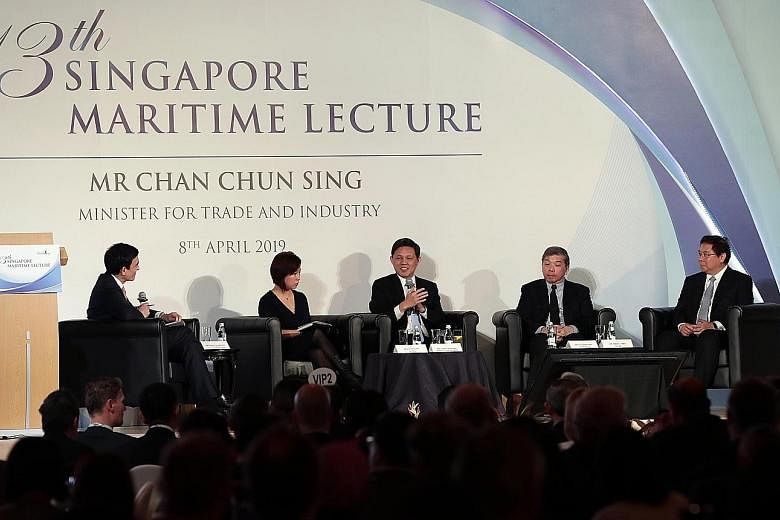As climate change melts the Arctic ice and opens alternative routes for cargo ships plying between Asia and Europe, trade could be diverted from the Malacca Strait and the Singapore Strait, posing a challenge to Singapore's maritime status.
But Asia's rise will create growth opportunities for shipping. Experts forecast that six out of the world's 10 largest economies will be in Asia by 2030, with 66 per cent of the world's middle class.
These developments, coupled with technological advancements and protectionism, are the key forces that will require Singapore to rethink its maritime strategy, Trade and Industry Minister Chan Chun Sing said yesterday.
How well Singapore can navigate the challenges and opportunities generated by these driving forces will decide its status as a global hub port and international maritime centre.
"Geography is not destiny. It can neither prescribe our failure nor promise our success," said Mr Chan when delivering the 13th Singapore Maritime Lecture to 400 maritime professionals at The Ritz-Carlton, Millenia Singapore. "Our answer to the driving forces of demographics and climate change must be to go where trade flows will be."
One way is to establish links with key markets, which Singapore has been doing and will continue to do, he said, citing the European Union-Singapore Free Trade Agreement (FTA). Once this FTA comes into force, qualifying exports from Singapore will benefit from 25 trade agreements with 64 trading partners, he noted.
Meanwhile, maritime businesses can expect access to more markets through future FTAs, he said.
These include the Regional Comprehensive Economic Partnership - a deal being negotiated by all 10 Asean countries and six Asia-Pacific nations, such as China and India.
Such partnerships will keep Singapore resilient in a time of rising protectionism, Mr Chan added.
Singapore is also repositioning itself as not just a port operator, but also a "global maritime platform", transcending its dependence on its geographical advantages.
The minister pointed to the Asean Single Window - a digital platform that allows traders to benefit from expedited cargo clearance and reduced paperwork - as well as Singapore's Networked Trade Platform, which was launched last year and combines all Customs and trade-related services on a single platform.
"By digitalising the paper trail and making data analytics tools readily available, we help traders leverage technology to transform their businesses," said Mr Chan.
The sharing of such platforms by companies and countries to enhance business-to-business and business-to-government operations will allow Singapore to reap greater efficiencies in time and cost, he said. But to succeed as a maritime hub, it will need to broaden and deepen its "maritime service offerings by strengthening complementary adjacent sectors such as finance, insurance, commodity trading and logistics".
He cited the Singapore War Risks Insurance Conditions launched earlier this year which provides cover even for ships not registered here.
He also noted the need to defend and update the "open rules-based global trading order" which has allowed nations to prosper. "We must continue to work with like-minded partners to resist the fragmentation of the world order and uphold established rules of law," he said.
He noted that Singapore built its first container terminal - also the first in South-east Asia - in 1969, "when no container ship sailed through the region".
"Amid global uncertainties, the true measure of our strength will once again be how we rise to meet the challenges and opportunities of tomorrow," he said.
In a panel discussion after the lecture, Singapore Maritime Foundation chairman Andreas Sohmen-Pao noted that since 2011, global trade volumes have increased at a slower pace compared with real gross domestic product growth.
But OCBC Bank chief executive Samuel Tsien pointed out that a growing middle class had increased service trade, an important element of capital flow.
Describing trade as Singapore's lifeline, Mr Chan said the country has to leverage five things - data, finance, rules, talent and technology - to enhance its success. "Our growth, our survival, will no longer depend on our geographical location."
SEE BUSINESS


